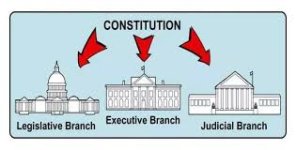Once hailed as the backbone of democracy, is the separation of powers now just a political illusion?
The separation of powers — dividing government into executive, legislative, and judicial branches — was designed to prevent tyranny, limit corruption, and ensure checks and balances. But in today's hyper-partisan, media-driven world, many question whether it still functions as intended… or if it has been silently eroded by ambition, gridlock, and manipulation.
 Executive Overreach?
Executive Overreach?
Presidents and Prime Ministers around the world have increasingly used executive orders, emergency powers, and foreign policy maneuvers to bypass legislative scrutiny. What was once rare is now routine. Is this decisive leadership—or dangerous power creep?
 Legislative Paralysis?
Legislative Paralysis?
Parliaments and Congresses often seem paralyzed by political division, incapable of passing meaningful laws or holding the executive accountable. When compromise is a dirty word, how can legislation act as a true counterbalance?
 Judicial Activism or Accountability?
Judicial Activism or Accountability?
Judiciaries are tasked with being neutral interpreters of the law, but they are often accused of political bias, activism, or being weaponized by ruling parties. When judges become politicians in robes, who really wins?
 System Breakdown or System Evolution?
System Breakdown or System Evolution?
Critics argue that the separation of powers is outdated—built for a simpler time. Supporters believe it's more vital than ever, offering a lifeline against authoritarianism. The truth? The system isn’t broken—but it’s being tested like never before.
In the age of global crises, digital manipulation, and mass polarization, we must ask:
Are these three branches truly independent—or are they just three faces of the same political coin?
 It’s not just about institutions—it’s about accountability.
It’s not just about institutions—it’s about accountability.
 It’s not just about power—it’s about who’s watching whom.
It’s not just about power—it’s about who’s watching whom.
The real question isn’t whether separation of powers works. It’s whether we still have the courage to defend it.
 What’s your verdict: timeless safeguard or political theater?
What’s your verdict: timeless safeguard or political theater?
The separation of powers — dividing government into executive, legislative, and judicial branches — was designed to prevent tyranny, limit corruption, and ensure checks and balances. But in today's hyper-partisan, media-driven world, many question whether it still functions as intended… or if it has been silently eroded by ambition, gridlock, and manipulation.
Presidents and Prime Ministers around the world have increasingly used executive orders, emergency powers, and foreign policy maneuvers to bypass legislative scrutiny. What was once rare is now routine. Is this decisive leadership—or dangerous power creep?
Parliaments and Congresses often seem paralyzed by political division, incapable of passing meaningful laws or holding the executive accountable. When compromise is a dirty word, how can legislation act as a true counterbalance?
Judiciaries are tasked with being neutral interpreters of the law, but they are often accused of political bias, activism, or being weaponized by ruling parties. When judges become politicians in robes, who really wins?
Critics argue that the separation of powers is outdated—built for a simpler time. Supporters believe it's more vital than ever, offering a lifeline against authoritarianism. The truth? The system isn’t broken—but it’s being tested like never before.
In the age of global crises, digital manipulation, and mass polarization, we must ask:
Are these three branches truly independent—or are they just three faces of the same political coin?
The real question isn’t whether separation of powers works. It’s whether we still have the courage to defend it.

